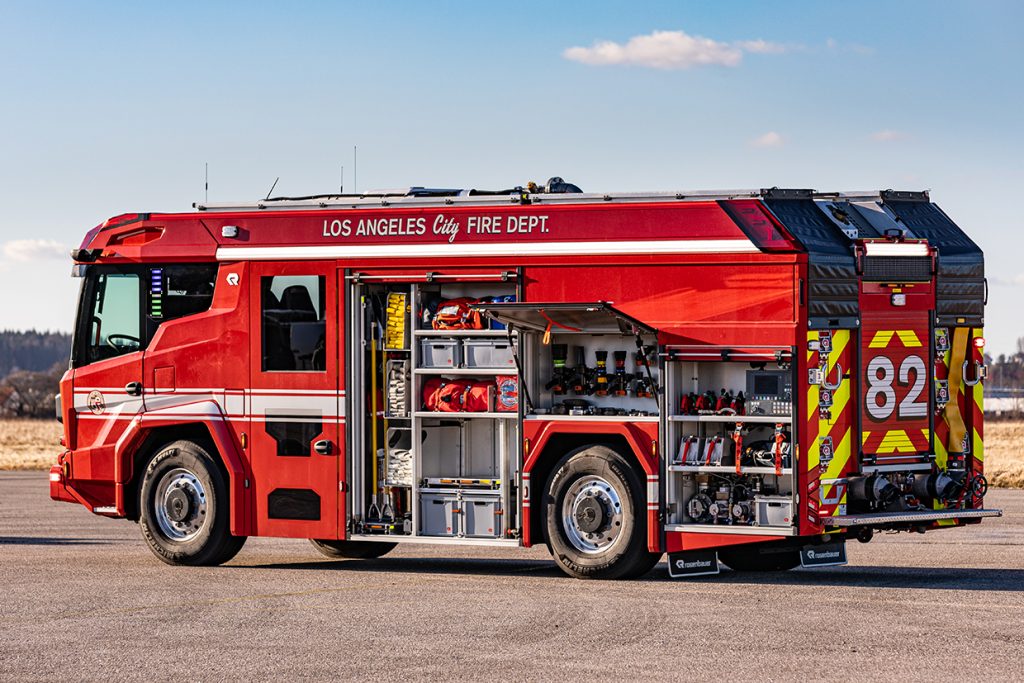
It’s almost time for Coronado to buy a new fire engine, and this time, it may be electric.
“I’ll be the first to admit, when I joined the fire service 25 years ago, I never thought that I’d be researching an electric engine,” said Coronado Fire Chief Jason Summers. “But needless to say, I am here now.”
Electric fire engines carry some advantages over traditional diesel engines, though they are also new technology, which brings concerns.
City leaders say they are intrigued by the idea, but they want more information before making a decision.
Traditional, diesel fire engines operate on a 16-year lifecycle. The first eight of those years, the vehicle is considered frontline, and then, for its remaining eight, it serves as a backup. The Coronado Fire Department has three vehicles in its fleet: two fire engines and an aerial truck.
The department is due to replace one engine in 2026, and has $1.3 million appropriated to do so.
There are not many electric fire engines on the market, and Summers presented the Rosenbauer RTX electric fire engine to the Coronado City Council during its Sept. 17 meeting.
The presentation did not require action from the council; rather, City Manger Tina Friend wished to know if the council wanted to include electric options as it decided on a new engine. Council members all had questions, but were intrigued, and Friend said she will bring more information before the council in an upcoming meeting.
The RTX, while fully electric, has a diesel generator.
“One of my questions was, ‘What happens if the battery runs out? We just die on the side of the road while we’re pumping?’” Summers said. “But Rosenbauer installed that generator to charge the batteries, so that when the batteries themselves fall to a certain percentage, the generator kicks on.”
With the battery, the engine has an operational range of 375 miles. Its battery recharges in 20 to 25 minutes, whether via generator or plugged in.
The RTX carries some key advantages over traditional, diesel engines: Its all-wheel drive and independent suspension allow it to “crabwalk,” which Summers said is difficult to explain but likened it to a sideways or diagonal motion, allowing great maneuverability into tight spaces.
It also can “pump and roll,” or move forward as it pumps water, something the current fleet cannot do. This is particularly helpful in fighting wildfires.
It is also safer, Summers said. It is nearly silent as it pumps. Currently, Summers said firefighters must yell while standing next each other as the pump operates, and 30% of firefighters suffer from hearing loss.
Firefighters can exit the vehicle from any door, something that is not true in the current model. When responding to traffic accidents on highways, exiting on the traffic side of the engine presents a safety concern.
And, the reduction in diesel emissions would provide a healthier work environment. Firefighters have a 9% increased risk of developing cancer, according to research from the US Centers for Disease Control and Prevention and the National Institute for Occupational Health and Safety.
Of course, the new technology does not come without drawbacks. One negative, in fact, is that it’s new.
Not many jurisdictions in the United States have electric engines, so there is little data on their performance, maintenance needs, and downtime. The city council as a whole agreed that it would need better data on the engines’ reliability, downtime, and maintenance before making a decision.
The engines are also expensive: The RTX would cost $2.2 million, versus the $1.3 million price of a traditional diesel engine.
“It does come with a heavy price tag,” Summers said, “although there’s certainly some interesting cost analysis that argues that over time, you’ll save money depending on fuel and maintenance costs.”
Summers said the fire department has spent about $105,000 on diesel fuel over the last eight years.
There is also less information about an electric fire engine’s life cycle. The 16-year lifecycle is widely accepted for diesel engines, but there is less information about electric engines. If the electric engine lasted longer, the higher price tag might be worth it, but it could also diminish faster.
The city would need to upgrade its infrastructure as well, as the RTX requires a 480-volt transformer to allow for charging. This carries an estimated cost of $40,000. However, Summers noted, Rosenbauer is currently developing a battery that can charge on a 220-volt plug, which, if released by acquisition time, would not require an upgrade to fire station infrastructure.
Other challenges include training, the unknown resale value of electric engines, and battery life and maintenance. According to Rosenbauer, the RTX’s battery loses about 1% of capacity annually. If that holds true, Summers said, the battery would not be of concern over a traditional, 16-year life cycle.
Despite the unknown, the council agreed: The prospect was intriguing, and they would like to include electric engines in the discussion of the fire department’s next acquisition – with more information about its reliability, maintenance, and the terms of a potential purchase contract.
Residents who spoke during public comment agreed. Mark Warner suggested that the city consider not whether to buy the engine, but instead, the timing of the purchase. Just as the cost of Tesla vehicles has decreased over the years, he said, the cost of these engines may as well.
Meanwhile, Amy Steward, who said her sister-in-law developed firefighting-related, stage four cancer, said the health of firefighters should remain a priority.
“For me, it’s simple,” she said. “Why wouldn’t you do everything possible to take care of the people who take care of us?”




